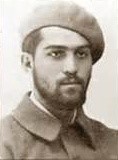Saga of an Ambulance – by John Tisa
John Tisa, The Volunteer. Volume 4, Number 2, 1982.
Dr. Pike and I drove together to Madrid in the early morning of 18 May 1937 – he for medical supplies, and I with a stack of unedited materials for the Volunteer for Liberty, our new front line tabloid. Here is a story he told me on the way about an event that took place in February which I wrote up and with his permission planned to use with his by-line. I found it among my personal possessions years later and have long forgotten why it missed being printed in the Volunteer.
A quiet morning, a calm, peaceful countryside—hardly a time for an attack. We had just left the truck at the point where our narrow, winding, hill-climbing road joined the main cement road. We were stationed where our one ambulance labored between this point and the first aid station. One hundred yards away from the trench, the enemy bombardment began. We were bringing supplies to the first aid posts: bandages, dressings, splints and stimulants in preparation for the sad processing of our wounded.
Shells and shrapnel exploded all around us. After only a few minutes of this terrifying shelling, the driver fled with his truck. We cursed and went on up the trail. Mentally, subconsciously, I noted the ghastly rhythm of the madly exploding shells, five, six explosions, then a breath-saving pause. During each pause we ran forward, then dropped flat on the ground when the shelling resumed. At times loose dirt and small stones struck us. We took refuge in an abandoned dugout and saw two duds strike the hillside, not more than 10 to 15 yards from us. It was madness, but we went on.
The enemy was shortening his range, the shelling pursuing us all the way to the half-way kitchen and then to our first aid post. There we found our ambulance, and I could not help a momentary feeling of pride and work well done. This was to be our first effort with our ambulance in transmitting wounded 200 yards from the front line, a matter of five minutes to the main road. We were to abandon our old painful stretcher-bearing route which was an hour and twenty minutes long. But that congratulatory feeling was short-lived. In ten minutes a piece of shrapnel tore through the side of our ambulance, flattening a rear tire while flying stones punctured another two, and we had no spares. I ordered the ambulance driver down the hill. The driver argued that the wheel frames would be ruined, but finally agreed to take it for repairs. He disappeared and was not seen again.
Message after message went down, but there was no news of the ambulance until I got a report that an ambulance was at the foot for the road, several miles down, and that the driver refused to ascend because of the heavy shelling and aerial bombardments. I sent a message with orders to the driver to return with the ambulance, but the messenger returned with the news that the driver and the ambulance had fled. Our bleeding wounded were beginning to arrive and they had to be treated first and carried, by hand stretcher, down the long difficult path. Munitions and food trucks were arriving, adding to the confusion and congestion of the road. An official car was commandeered. A volunteer was asked to search for and bring the missing and much needed ambulance. Hy Rosner volunteered. He had just returned from a rear hospital after two sieges of illness. He was weak and pale, yet he was volunteering for this dangerous task: traversing a road which for hours had been under heavy shell fire, and now with the added danger of rifle and machine gun fire crisscrossing the entire area. His orders were simple, yet extremely difficult: “bring back the ambulance!”
“If I bring it back, can I drive it, can I be your driver?” He eyed me anxiously, eagerly.
“Yes.”
Half an hour later the ambulance appeared, the same ambulance that others said couldn’t make the trip.
“I saw this ambulance on the road,” Hy said, “jumped in and drove it off.”
A mild mannered man, faithful and courageous, Hy has driven that ambulance ever since – succeeding where three other, physically superior, had failed. I am proud of my ambulance driver. He is one of the most valuable men in the medical unit and in the whole Lincoln Battalion.
Postscript – After returning from Spain Hy worked for a while in a drug store in N. Y. Then he joined the NMU and in his own words “shipped out on an oil tanker even before the U.S. got into the war. I was on this tanker a year. We were on our way home when we got into a battle with the Nazis off the coast of France. The fight lasted about three days. In the last moment of this battle, I lost part of my leg.”
Then he returned to N.Y. and ran a newsstand until his retirement. After retiring Hy moved to Colorado, and finally to San Francisco, where he is now living and is a member of the S.F. post of the VALB.













